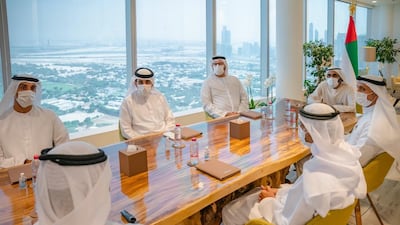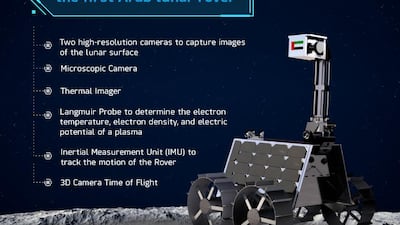The UAE Space Agency has signed an agreement to be part of the Artemis Accords, an international treaty by US space agency Nasa that outlines responsible and peaceful space exploration.
Created earlier this year, the Accords set international standards of how the Moon should be explored and lists guidelines on activities such as mining on the Moon, releasing scientific data publicly, transparency with the public on policies and providing emergency assistance.
Nasa is moving forward with plans to establish a human base on the Moon and a lunar-orbiting space station through the Artemis programme.
The ultimate goal is to use the Moon as a base to send astronauts to Mars.
“Artemis will be the broadest and most diverse international human space exploration programme in history, and the Artemis Accords are the vehicle that will establish this singular global coalition,” Jim Bridenstine, Nasa administrator said.
“With today’s signing, we are uniting with our partners to explore the Moon and are establishing vital principles that will create a safe, peaceful, and prosperous future in space for all of humanity to enjoy.”
Other countries that have signed the Accords are Australia, Canada, Italy, Japan, Luxembourg and the United Kingdom.
The pact will create opportunities for collaboration between agencies who also plan to reach the Moon.
The UAE is to launch a small rover to the near side of the Moon by 2024. Nasa will also launch a lunar mission, Artemis 1, in the same year, a crewed lunar fly-by in 2023 and send the first woman and next man on the surface by 2024.
The Accords also list “safety zones” on the Moon, where mining and exploration will take place.
The Moon is said to be rich in metals like iron and titanium, which can be used to further develop outer-space technology.
UAE’s lunar mission aims to provide scientific and technological answers on how mobility on the surface can be improved and to find better astronaut suit materials.
“From agreeing on basic standards regarding the interoperability of systems through to underpinning important principles of safety and standards to guide operational excellence, the Accords help us to work together for the benefit of all,” said Sarah Al Amiri, UAE Minister of State for Advanced Technology and chairwoman of the UAE Space Agency.
“It is in this spirit that we welcome this initiative Nasa has taken to strengthen the broad principles of peaceful human collaboration and co-existence in space.”
While Nasa has received a lot of international support for its Artemis programme, the head of Russia’s space programme recently said the American space agency’s plans were “too US-centric” for Russia to participate.
Dmitry Rogozin, director-general of Roscosmos, also has not shown interest in becoming an Artemis Accords partner.
“The most important thing here would be to base this programme on the principles of international co-operation that we’ve all used [to fly the International Space Station]," Mr Rogozin said during a virtual press conference at the International Astronautical Congress on Monday.
“If we could get back to considering making these principles as the foundation of the programme, then Roscosmos could also consider its participation.”
However, he expressed in interest in using the docking gateway of Lunar Gateway – the lunar-orbiting space station Nasa is planning – in the future.
Mr Bridenstine said that Nasa and its international partners remained hopeful of working more closely with Russia.















